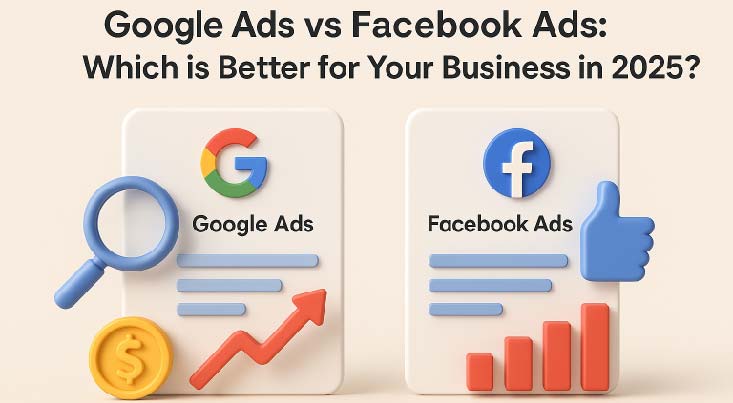Google Ads vs. Facebook Ads: Which Is Better for Your Business in 2025?
In today’s competitive digital world, paid advertising is no longer optional—it’s a necessity. Whether you’re a startup or a growing brand, you’ve likely asked:
“Should I invest in Google Ads or Facebook Ads?”
While both platforms are powerful in their own right, your choice should depend on your business goals, target audience, and budget. Let’s break down the strengths of each platform so you can make the right decision for your business in 2025.
Audience Intent: Search vs Discovery
Google Ads targets users with high buying intent. When someone searches “best digital agency in Lahore,” they are actively looking for a solution. That’s where Google Ads shines.
Facebook Ads (now Meta Ads) reach users while they browse their feeds. It’s about discovery, brand awareness, and storytelling.
Best For:
Google Ads: Leads & sales from people ready to act
Facebook Ads: Introducing new products, building brand presence
Related: Digital Marketing Services by Edlancer
Cost & Budget Control
Google Ads generally have a higher cost per click (CPC), especially in competitive niches like legal, insurance, or tech.
Facebook Ads offer lower CPC and Cost Per Thousand Impressions (CPM), making them ideal for low-budget reach.
Tip: Start with Facebook Ads for awareness and retarget with Google Ads for conversion.
External Resource: WordStream – Google Ads Benchmarks
Targeting Capabilities
Google Ads: Location, device, and keyword-based targeting.
Facebook Ads: Interests, behaviors, custom audiences, and lookalikes.
Facebook’s pixel allows hyper-personalized targeting, while Google is stronger for intent-based search traffic.
Ad Formats & Creative Freedom
Google supports:
Search Ads
Display Network
Shopping Ads
YouTube Video Ads
Facebook/Instagram Ads:
Image & video ads
Carousel, stories, reels, instant experiences
Visual storytelling is stronger on Meta platforms, perfect for e-commerce and fashion brands.
Related: Edlancer’s Social Media Marketing Solutions
Analytics & Tracking
Google Ads offers robust integration with Google Analytics, GA4, and Search Console.
Facebook Ads relies on Meta Pixel, Conversion API, and in-platform analytics.
With privacy updates (like iOS 14+), Facebook tracking has become slightly limited—but still powerful with the right setup.
Google vs Facebook Ads: Quick Comparison Table
| Feature | Google Ads | Facebook Ads |
| User Intent | High (search-based) | Medium (interest-based) |
| Cost (CPC) | Higher | Lower |
| Visual Flexibility | Limited (text-heavy) | High (videos, stories, reels) |
| Targeting Depth | Good (keywords, demographics) | Excellent (interests, lookalikes) |
| Best For | Leads, service businesses | Brand awareness, ecommerce |
So, which is better for you?
If your audience is actively searching for your services, go with Google Ads.
If you’re building brand awareness, launching a product, or working with a limited budget—start with Facebook Ads.
Want the best ROI? Use both in a strategic funnel:
Facebook for awareness
Google for conversion
Let Edlancer Run Your Paid Campaigns Professionally
At Edlancer, we don’t believe in “one-size-fits-all.” Our digital marketing experts design custom ad strategies that match your brand and audience—whether it’s Google, Facebook, or both.
✅ What we offer:
Google Ads setup & optimization
Facebook/Instagram Ads creative + targeting
Conversion tracking
A/B Testing & reporting
📩 Need help launching a high-converting ad campaign?
👉 Contact us today, and let’s build your growth engine together!
Final Thoughts
In 2025, smart businesses will no longer choose either Google or Facebook Ads—they’ll integrate both based on real data and user behavior.
Success lies not just in choosing a platform, but in how you use it.
Let the experts at Edlancer guide you toward smarter ad decisions.













Write a Comment